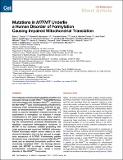| dc.contributor.author | Tucker, Elena J. | |
| dc.contributor.author | Hershman, Steven G. | |
| dc.contributor.author | Belcher-Timme, Casey A. | |
| dc.contributor.author | Patel, Jinal | |
| dc.contributor.author | Goldberger, Olga A. | |
| dc.contributor.author | Christodoulou, John | |
| dc.contributor.author | Silberstein, Jonathon M. | |
| dc.contributor.author | McKenzie, Matthew | |
| dc.contributor.author | Ryan, Michael T. | |
| dc.contributor.author | Compton, Alison G. | |
| dc.contributor.author | Jaffe, Jacob D. | |
| dc.contributor.author | Carr, Steven A. | |
| dc.contributor.author | Calvo, Sarah E. | |
| dc.contributor.author | RajBhandary, Uttam L. | |
| dc.contributor.author | Thorburn, David R. | |
| dc.contributor.author | Mootha, Vamsi K. | |
| dc.contributor.author | Koehrer, Caroline | |
| dc.date.accessioned | 2014-12-11T19:31:32Z | |
| dc.date.available | 2014-12-11T19:31:32Z | |
| dc.date.issued | 2011-09 | |
| dc.date.submitted | 2011-07 | |
| dc.identifier.issn | 15504131 | |
| dc.identifier.uri | http://hdl.handle.net/1721.1/92287 | |
| dc.description.abstract | The metazoan mitochondrial translation machinery is unusual in having a single tRNA[superscript Met] that fulfills the dual role of the initiator and elongator tRNA[superscript Met]. A portion of the Met-tRNA[superscript Met] pool is formylated by mitochondrial methionyl-tRNA formyltransferase (MTFMT) to generate N-formylmethionine-tRNA[superscript Met] (fMet-tRNA[superscript met]), which is used for translation initiation; however, the requirement of formylation for initiation in human mitochondria is still under debate. Using targeted sequencing of the mtDNA and nuclear exons encoding the mitochondrial proteome (MitoExome), we identified compound heterozygous mutations in MTFMT in two unrelated children presenting with Leigh syndrome and combined OXPHOS deficiency. Patient fibroblasts exhibit severe defects in mitochondrial translation that can be rescued by exogenous expression of MTFMT. Furthermore, patient fibroblasts have dramatically reduced fMet-tRNA[superscript Met] levels and an abnormal formylation profile of mitochondrially translated COX1. Our findings demonstrate that MTFMT is critical for efficient human mitochondrial translation and reveal a human disorder of Met-tRNA[superscript Met] formylation. | en_US |
| dc.description.sponsorship | National Institutes of Health (U.S.) (GM17151) | en_US |
| dc.language.iso | en_US | |
| dc.publisher | Elsevier | en_US |
| dc.relation.isversionof | http://dx.doi.org/10.1016/j.cmet.2011.07.010 | en_US |
| dc.rights | Article is made available in accordance with the publisher's policy and may be subject to US copyright law. Please refer to the publisher's site for terms of use. | en_US |
| dc.source | Elsevier | en_US |
| dc.title | Mutations in MTFMT Underlie a Human Disorder of Formylation Causing Impaired Mitochondrial Translation | en_US |
| dc.type | Article | en_US |
| dc.identifier.citation | Tucker, Elena J., Steven G. Hershman, Caroline Kohrer, Casey A. Belcher-Timme, Jinal Patel, Olga A. Goldberger, John Christodoulou, et al. “Mutations in MTFMT Underlie a Human Disorder of Formylation Causing Impaired Mitochondrial Translation.” Cell Metabolism 14, no. 3 (September 2011): 428–434. © 2011 Elsevier Inc. | en_US |
| dc.contributor.department | Massachusetts Institute of Technology. Department of Biology | en_US |
| dc.contributor.mitauthor | Koehrer, Caroline | en_US |
| dc.contributor.mitauthor | RajBhandary, Uttam L. | en_US |
| dc.relation.journal | Cell Metabolism | en_US |
| dc.eprint.version | Final published version | en_US |
| dc.type.uri | http://purl.org/eprint/type/JournalArticle | en_US |
| eprint.status | http://purl.org/eprint/status/PeerReviewed | en_US |
| dspace.orderedauthors | Tucker, Elena J.; Hershman, Steven G.; Kohrer, Caroline; Belcher-Timme, Casey A.; Patel, Jinal; Goldberger, Olga A.; Christodoulou, John; Silberstein, Jonathon M.; McKenzie, Matthew; Ryan, Michael T.; Compton, Alison G.; Jaffe, Jacob D.; Carr, Steven A.; Calvo, Sarah E.; RajBhandary, Uttam L.; Thorburn, David R.; Mootha, Vamsi K. | en_US |
| dc.identifier.orcid | https://orcid.org/0000-0002-4530-5647 | |
| dspace.mitauthor.error | true | |
| mit.license | PUBLISHER_POLICY | en_US |
| mit.metadata.status | Complete | |
